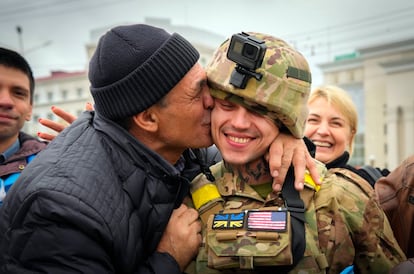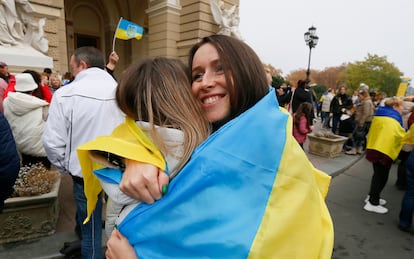To negotiate or not negotiate with Putin? Kyiv’s allies divided after Russian retreat from Kherson
Ukraine remains steadfast on talks and the White House believes there is still advantage to be won on the ground but others in Washington and Europe are urging a diplomatic end to the war

The Ukrainian flag is flying over Kherson once again, Kyiv’s troops have entered the city and, although the situation is still not entirely secure and living conditions remain difficult, the population of the formerly occupied provincial capital are continuing their celebrations. Russian forces have withdrawn to the eastern bank of the Dnipro and the resounding defeat of Vladimir Putin’s battalions in the fight to retain control of the area, which Moscow illegally annexed in September along with three other provinces – Zaporizhzhia, Luhansk and Donetsk – represents one of the biggest Ukrainian victories of the war. It has also reopened the debate in the West as to when the moment might arrive to start seeking a negotiated peace.
Despite the “strategic failure” – as described by UK Foreign Minister Ben Wallace – of the Russian military in Kherson, the only major objective at the outset of the invasion that Moscow managed to capture, the Kremlin remains firm in its stance. Kherson continues to be “a subject of the Russian Federation,” Putin’s spokesman Dmitry Peskov said after the withdrawal. “Nothing has changed.”
For its part, Ukraine’s intention is to continue the successful counter-offensive in the region launched two months ago. “We are winning battles on the ground. But the war continues,” said Kyiv’s Minister of Foreign Affairs Dmytro Kuleba following a meeting with US Secretary of State Antony Blinken in Cambodia.
Having retaken thousands of square miles captured during the early stages of the invasion – The New York Times puts the figure of liberated territory at 54% of initial Russian gains – Kyiv calculates there is still much to be won. For months, the government of Volodymyr Zelenskiy has ruled out any negotiation with Moscow, at least as long as Putin remains in power and Russian troops remain on Ukrainian soil. In October, after the sham referendums held in the annexed regions, a decree issued by Zelenskiy prohibited any contact with the current occupant of the Kremlin.
The White House shares Kyiv’s analysis: now is not the time to broach the subject of talks with Moscow. Ukraine is in a position to achieve further military gains and strengthen its position ahead of any potential negotiation. On the other hand, as intimated by Peskov, the Kremlin is showing no sign of being willing to cede anything. US National Security Advisor Jake Sullivan told reporters aboard Air Force One on November 11 that Moscow “doubling down” on its illegal annexation of Kherson was “not exactly a sign of seriousness about negotiating. As long as Russia holds the position that it simply gets to grab as much territory as it wants by force, it’s hard to see them as a good-faith counterparty in a negotiation.”

Internal debate in Washington
However, in Washington, an internal debate has emerged as to how to proceed. Chairman of the Joint Chiefs of Staff, General Mark Milley, advocates a diplomatic solution to make the most of Ukraine’s military successes on the ground and the arrival of winter, which will lead to a pause in hostilities on the front lines. Milley suggested during a conference in New York that a decisive military victory for Kyiv is unlikely to be achieved and that other options should be explored under the current circumstances. “When there’s an opportunity to negotiate, when peace can be achieved, seize it. Seize the moment,” the general said.
Some US officials agree that diplomatic routes should be explored. The general consensus in Washington is that sooner or later the outcome of the war will be decided at the negotiating table, and the Biden administration wants to be ready when the moment arrives. It also wants to encourage Zelenskiy to be more open to the possibility, which has been firmly closed after a tepid attempt at talks in the opening weeks of the invasion. The most recent diplomatic contacts, including a visit to Kyiv by Sullivan last week, have been tense. Biden himself has said the US will not pressure Kyiv into negotiations, and that Zelenskiy will decide if and when they take place. “That’s up to the Ukrainians. Nothing about Ukraine without Ukraine,” the US president said last Wednesday.
There is though concern in Washington about “donor fatigue” among some of Kyiv’s allies, which may become more acute during the winter months when the energy crisis bites in Europe and places national supplies under strain. Biden’s administration also needs to reinforce its internal support. Last month, 30 of the 100 members of the Democratic Congressional Progressive Caucus in the House of Representatives sent a letter to the White House – which was later retracted – encouraging a negotiated resolution and direct dialogue with Moscow. A poll run by The Wall Street Journal at the beginning of November indicated that 48% of Republican voters feel that the US has become too involved in the war, compared to 6% who felt the same in March. Kevin McCarthy, the potential House Speaker after the midterm election results are finalized, has said he will rein in aid to Ukraine if he succeeds Nancy Pelosi in the role.
Ukrainian government sources have confirmed contact with Washington on the subject of talks, but said there had been no pressure applied. “There has been talk of the importance of Ukraine showing the world that we are not closing each and every door [to diplomacy], as long as Russia leaves the occupied territories,” those sources said.
Zelenskiy himself recently intimated in an interview with EL PAÍS that he does not entirely rule out negotiation, under the condition that Russian forces leave Ukraine entirely and the Kremlin admits its error in launching the invasion.
A decision for Kyiv
The White House has made it very clear that it will not back any initiative in which Putin could come out favorably, while also noting that a pause in the Ukrainian counter-offensive will give Russia’s military time to regroup and reinforce. Washington has also reinforced its commitment to provide Ukraine with as much financial and military aid as it needs, “for as long as it needs it.”
Meanwhile in Moscow, some circles close to the Kremlin elite have interpreted the withdrawal from Kherson – a political decision, not a military one, taken by Putin – as a small indication that Moscow might open the door to negotiations in the not-too-distant future. But although Moscow’s propaganda machine had been gearing to prepare public opinion about the Kherson withdrawal for days prior to the retreat across the Dnipro, there is no evidence that it is doing anything similar with a view to negotiation. There is also no indication that the Kremlin, in a hypothetical attempt to find a face-saving route out of the war, is sowing the rhetoric that it has already achieved the initial objectives of its “special military operation.”
However, the leaked information that Sullivan has had contacts with his counterpart in Moscow, Secretary of the Security Council of Russia Nikolai Patrushev, a former KGB officer and a close confidant of Putin, and with the Russian leader’s foreign policy advisor, have raised the possibility that the US and Moscow are laying the groundwork for diplomacy, although Washington denied those contacts had been to discuss Ukraine.
Many observers in Brussels are also of the opinion that the war will probably be concluded at the negotiating table, but they also concur with the White House that now is not the time to be pursuing such a course of action, given that Ukraine can still strengthen its tactical advantage on the ground and in diplomatic terms. They also agree with the US in that Moscow could use the winter lull to reinforce and resupply while building up its conscripts and mercenary units for deployment to the front. While some countries – Hungary, Cyprus and Italy – have been whispering that perhaps now is the time to approach Moscow, others led by the Baltic States and Poland are of the opinion that not only is it better to wait, but that furthermore it is Kyiv’s decision to make.
With Kyiv having recovered Kherson and forced the withdrawal of Russian forces to the far bank of the Dnipro while trying to consolidate gains in the Donbas region, the war is entering a decisive phase. As such, military strategy analysts also say now is not the time for negotiation. Ukraine’s military decisions over the next few days and weeks will be key to marking out the lines, a Western intelligence officer indicated. As will how Kyiv rides out the winter. Putin will bide his time while inflicting suffering on the civilian population with continued attacks against essential water and power infrastructure, while also banking on the EU’s support for Ukraine waning as a result of the energy crisis.
However, Russian troops will also suffer throughout the winter. Intelligence sources confirm that Moscow’s forces are ill-equipped to withstand the freezing temperatures and are lacking basic equipment, which has been the case since the invasion began. Ukraine’s troops, meanwhile, have been supplied with cold-weather gear and specialist equipment by their Western allies.
Tu suscripción se está usando en otro dispositivo
¿Quieres añadir otro usuario a tu suscripción?
Si continúas leyendo en este dispositivo, no se podrá leer en el otro.
FlechaTu suscripción se está usando en otro dispositivo y solo puedes acceder a EL PAÍS desde un dispositivo a la vez.
Si quieres compartir tu cuenta, cambia tu suscripción a la modalidad Premium, así podrás añadir otro usuario. Cada uno accederá con su propia cuenta de email, lo que os permitirá personalizar vuestra experiencia en EL PAÍS.
¿Tienes una suscripción de empresa? Accede aquí para contratar más cuentas.
En el caso de no saber quién está usando tu cuenta, te recomendamos cambiar tu contraseña aquí.
Si decides continuar compartiendo tu cuenta, este mensaje se mostrará en tu dispositivo y en el de la otra persona que está usando tu cuenta de forma indefinida, afectando a tu experiencia de lectura. Puedes consultar aquí los términos y condiciones de la suscripción digital.








































